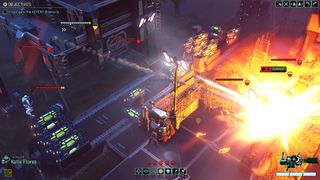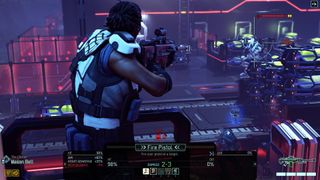Going deeper into XCOM 2: resistance isn't futile

These upgrades are invaluable in early battles, when you’re in charge of weak-willed rookies prone to freaking out mid-mission. The Specialist’s Revival Protocol upgrade—available once they’ve been promoted to Sergeant—can remove negative status effects, including panic. With it, you can spin a disastrous affliction into a net positive. Later in my hands-on session, a rookie loses it during an encounter with a Viper. He takes an automatic panic shot, hitting the snake lady, but not finishing her off. Using the Gremlin, I remove the effect. The soldier now has a regular full turn with which to finish off his foe. Not that this is a tactic you want to rely on, as panicked soldiers can just as easily grenade the wall you’re using as cover—blowing it out and leaving you harmed and exposed.
The Specialist also saves my skin during a timed mission to hack into an Advent network. I had eight turns, most of which were spent dealing with Advent troops outside a petrol station. When I finally reach the building that houses the terminal, I have one turn remaining, but the only soldier in range of the terminal has been grabbed and bound by a Viper. Fortunately, I realise, I can send in the Gremlin. Hacking a terminal has a guaranteed effect—in this case breaching the network—and also provides a chance of picking up two bonus rewards.
The likelihood of unlocking these bonuses is based on the difference in tech score between the hacker and the terminal they’re trying to unlock. I’m offered a permanent bonus to my Specialist’s hacking score, and a four week upgrade to my home base’s scanning ability. Other potential rewards are more immediate, such as blinding nearby enemies for a couple of turns. I receive nothing—my Specialist’s score is too low. Luckily, this time there isn’t an associated penalty. Later in the campaign, failed attempts can trigger negative effects.

Timed missions aren’t XCOM 2’s only trick for putting the player under pressure. Enemy Within’s Meld resource is gone, but a new loot system takes the same trick and applies it on a smaller scale. Downed enemies have a chance to drop loot that will self-destruct after three turns. That loot takes the form of weapon attachments—everything from scopes that increase aim to repeaters that have a chance to instantly kill a target. It’s a bonus less essential and abstract than Meld, but useful enough to be desirable.
The effect is lots of small-scale, focused bursts of risk/reward decision making. If loot appears at the start of a battle, there’s no guarantee it will still be around when it’s over. Retrieving it could be disastrous, but better weapons means being better equipped to deal with future missions. Between the new abilities and the external pressures, XCOM 2’s challenge isn’t just about the brutality of the aliens—although they are brutal. There is also plenty of scope for for shooting yourself in the foot through poor decision choices.
“We wear that as a badge of honour, that it’s a challenging game,” says DeAngelis. “In fact, we want it to be brutally challenging. We want you to have to overcome those odds, because the sense of triumph is truly powerful. We want players to be able to learn that and earn that on their own.”
It’s not all failure and disempowerment. In XCOM 2, each mission starts with a moment of empowerment—a chance to ambush the enemy and take them out unseen. This concealment phase is in keeping with the idea of XCOM as a guerrilla force. When your soldiers arrive on the map, they’re undetected, and will remain so as long as they don’t open fire, move too close to the enemy, or create excessive noise by smashing through a door or window. In this way, I’m able to surround a group of Advent, setting the majority of my force to concealment overwatch—a special ambush variant that tells your soldiers to only open fire if detected.
PC Gamer Newsletter
Sign up to get the best content of the week, and great gaming deals, as picked by the editors.

Phil has been writing for PC Gamer for nearly a decade, starting out as a freelance writer covering everything from free games to MMOs. He eventually joined full-time as a news writer, before moving to the magazine to review immersive sims, RPGs and Hitman games. Now he leads PC Gamer's UK team, but still sometimes finds the time to write about his ongoing obsessions with Destiny 2, GTA Online and Apex Legends. When he's not levelling up battle passes, he's checking out the latest tactics game or dipping back into Guild Wars 2. He's largely responsible for the whole Tub Geralt thing, but still isn't sorry.
Most Popular

